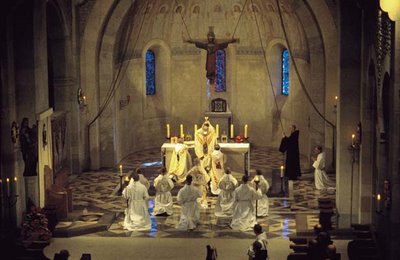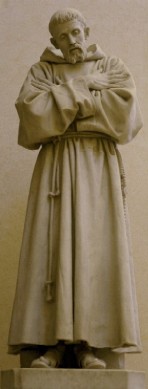
There is an excellent article over at The New Liturgical Movement, which deals with our current liturgical environment and what may have been pre-cursors to the chaos with which we are now dealing.
Quote from the article:
I hold that it was the lived experience of the liturgy in the context of cloistered life that precisely made it possible for the scholastics to soar into the heights of philosophical speculation without losing their own familiarity with the fathers and scripture. As for the "monastic" life that the greatest medieval doctors lived, its contribution was not simply as a framework for the daily liturgy. Rather, the monastic life, with its institutions, its mentality derived straight from the Fathers, made it possible to fully live the patristic and evangelical spirit present in the liturgy.
I can't really articulate my thoughts, but as I was reading this, it seems like he is also explaining why religious life has had some major problems too. There certainly seems to be an interconnectedness between the liturgy, a strong understanding of the Faith, and an observant ("well structured") religious life which is focused on the liturgy. This would especially be true of the Benedictine (and Cistercian and Trappist) Orders who follow the Rule of Saint Benedict, who says: "Indeed, nothing is to be preferred to the Work of God" (RB 43:3) ie the Divine Office and Mass.
The article is well worth the read:
"Scholasticism, Liturgy and Monasticism" by Carlos Antonio Palad






2 comments:
Couldn't agree more.
Far too many Mass atmosphere's are like being at the mall on Saturday - noisy, back-slapping and more.
Saints were made in the very environments some would call "stuffy". It's great to see so many religous orders sprouting up which are traditional, such as those profiled in my sidebar section on vocations.
I'm so happy to be witnessing the spring which is before us!
Diane,
I have heard much about your parish from Fr. Clement who is a monk in Norcia who used to help at the Grotto, from Fr. Z, and from dadwithnoisykids who lived in the region.
Sounds very awesome.
Post a Comment